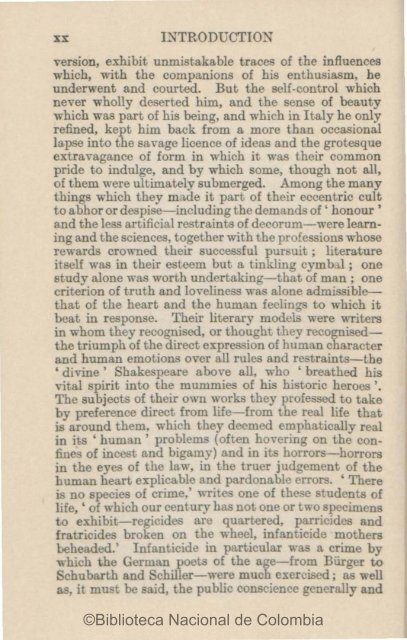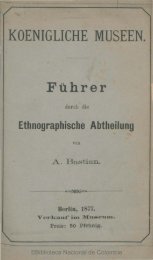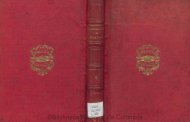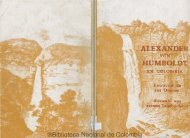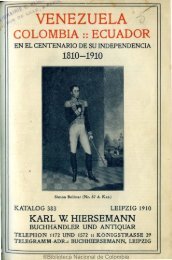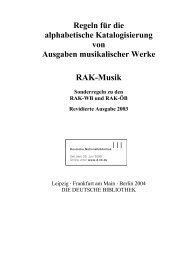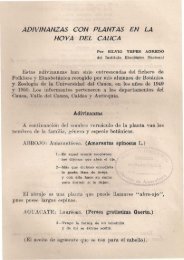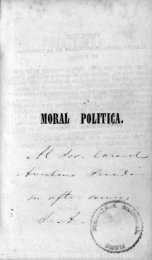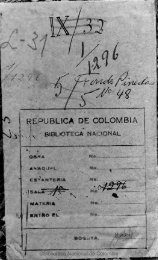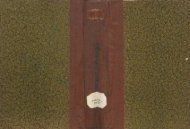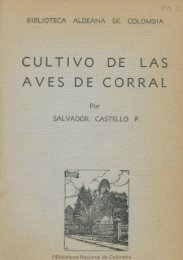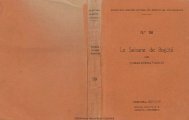©Biblioteca Nacional de Colombia
©Biblioteca Nacional de Colombia
©Biblioteca Nacional de Colombia
Create successful ePaper yourself
Turn your PDF publications into a flip-book with our unique Google optimized e-Paper software.
xx<br />
~TRODUCTIO~<br />
version, exhibit unmistakable traces of the influences<br />
which, with the companions of his enthusiasm, he<br />
un<strong>de</strong>rwent and courted. But the self·control which<br />
never wholly <strong>de</strong>serted him, and the sense of beauty<br />
which was part of his being, and which in Italy he only<br />
refined, kept him back from a more than occasional<br />
lapse into the savage licence of i<strong>de</strong>as and the grotesque<br />
extravagance of form in which it was their common<br />
pri<strong>de</strong> to indulge, and by which some, though not all,<br />
of them were ultimately submerged. Among the many<br />
things which they ma<strong>de</strong> it part of their eccentric cult<br />
to abhor or <strong>de</strong>spise-including the <strong>de</strong>mands of' honour '<br />
and the less artificial restraints of <strong>de</strong>corum-were learning<br />
and the sciences, together with the professions whose<br />
rewards crowned their successful pur uit; literature<br />
itself was in their esteem but a tinkling cymbJ.l; one<br />
study alone was worth un<strong>de</strong>rtaking-that of man; one<br />
criterion of truth and loveliness was alone admissiblethat<br />
of the heart and the human feelings to which it<br />
beat in response. Their literary mo<strong>de</strong>ls were writers<br />
in whom they recognised, or thought they recognisedthe<br />
triumph of the direct expression of human character<br />
and human emotions over all rules and restraints-the<br />
, divine' Shakespeare abo,e all, who 'breathed his<br />
vital spirit into the mummies of his historic heroes '.<br />
The subjects of their own works they professed to take<br />
by preference direct from life-from the real life that<br />
is around them, which they <strong>de</strong>emed emphatically real<br />
in its' human' problems (often hovering on the confines<br />
of incest and bigamy) and in its horrors-horrors<br />
in the eyes of the law, in the truer judgement of the<br />
human heart explicable and pardonable errors. 'There<br />
is no species of crime,' writes one of these stu<strong>de</strong>nts of<br />
life, , of which our century has not one or two specimens<br />
to exhibit-regici<strong>de</strong>s are quartered, parrici<strong>de</strong>s and<br />
fratrici<strong>de</strong>s broken on the wheel, infantici<strong>de</strong> mothers<br />
behea<strong>de</strong>d.' Infantici<strong>de</strong> in particular was a crime by<br />
which the German poets of the age-from Biirger to<br />
Schubarth and Schiller-were much exercised; as well<br />
as, it must be said, the public conscience generally and<br />
<strong>©Biblioteca</strong> <strong>Nacional</strong> <strong>de</strong> <strong>Colombia</strong>


